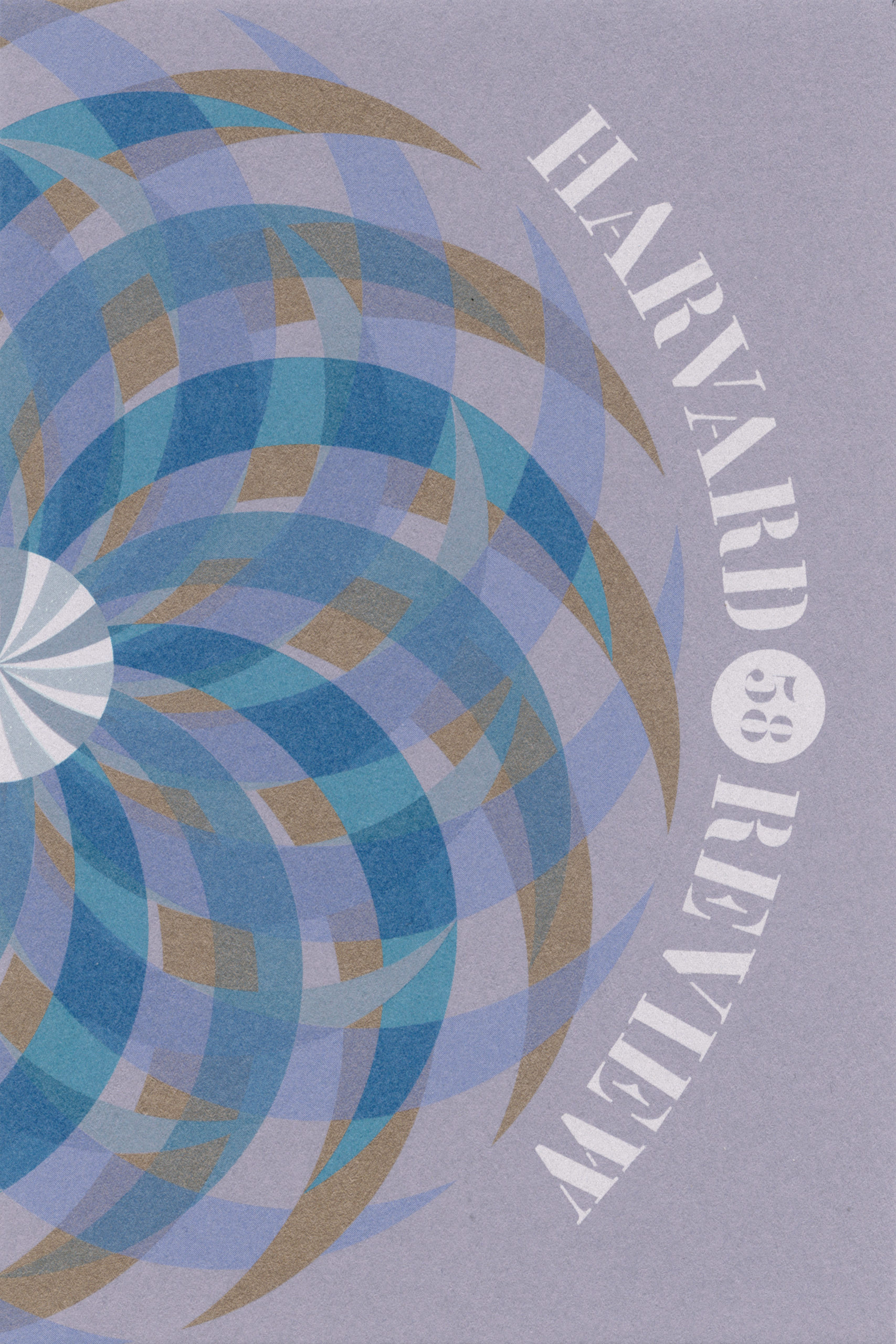HR 58 Editorial
by Christina Thompson
This year my eldest son turned thirty, and it felt—much more to me than to him, I’m sure—like the turning of a page. No longer strictly a youth, he seemed embarked upon an entirely new adventure, launched out on a whole new chapter of his life. Of course, such impressions have more to do with individual circumstances than with numbers per se, and yet, there is a symbolic gravity to round numbers that makes them difficult to resist.
In 2022, Harvard Review will also celebrate its thirtieth birthday. But while this is an interesting age for a young man, it is not quite what one would call a distinguished age for a literary journal. The Yale Review, founded in 1819, will celebrate its 203rd anniversary this year; the Sewanee Review, Poetry, and Southwest Review are all over a hundred; Kenyon Review, the Georgia Review, and the Paris Review are eighty-three, seventy-five, and sixty-nine respectively. Compared with our peers we are a recent arrival, but my hope is that the day will come when someone can look back on a run of Harvard Review spanning sixty, eighty, a hundred years.
At some point during the pandemic I was invited to think about this very subject not in relation to Harvard Review but to the Australian journal Meanjin. Meanjin is one of the oldest and most distinguished journals in Australia, and it is also the one on which I cut my editorial teeth. Last year it celebrated eighty years of publication, and in recognition of this milestone the current editor reached out to those of us who had been associated with the journal in the past. My tenure at Meanjin was not long—nothing like the years I have behind me at Harvard Review—and yet my thoughts were all about longevity. I recalled (with some lingering horror) the funding challenges I’d faced early on, how they had focused my attention, and especially my absolute determination not to be the person on whose watch a storied publication died.
From the very beginning I have felt this sense of responsibility, a belief that my role was one of stewardship and that one of the most important—and possibly least appreciated—dimensions of a literary journal is archival. Journals are ephemeral by nature; they are meant to be sites of trial and error. But they are also archives of taste and thought, records of how a given culture looked at the world at a particular point in time. This, in itself, is important, and the longer a journal lasts the more important it becomes. Each issue of Harvard Review is a contemporary compilation, but one can also view it, imaginatively, from some point in the future, when it will be a primary record of the past.
In each issue, there are pieces that seem as though they will be interesting to look back on: here, most obviously, the long essay by Russ Rymer on the fraught relationship between America’s North and South. A rich and complex narrative, “Northern Lights, Southern Cross” arises out of Rymer’s personal background as a progressive white Northerner with Southern roots, as well as his professional life as a political journalist. Among the many memorable moments in the essay is his recollection of the appallingly casual way in which the candidate Jimmy Carter was snubbed by the Northern liberal establishment—a detail that rang horribly true to me as a Northerner born and bred.
In Rymer’s essay, the political is inextricably entwined with the familial, and one of the more marked characteristics of this issue is the number of family stories it contains. This, too, feels like a sign of the times. Hunkered down as we have been these past two years—in some cases trapped with our families, in others prevented from seeing them at all—it isn’t surprising that mothers, fathers, husbands, wives, grandparents, and children should figure so largely in our work. Mothers and fathers, in particular, are everywhere in this issue: in a pair of poems by Tom Sleigh (including one with the great title “My Father as a Garden Snake”) and another by Sharon Olds, who writes that her mother is “gone to where / they cannot scare you, any more. / And no one, now, stood between me / and my life.” We have a story by Mark Chiusano about a trip to a summer cottage, which feels like a story about that phase of married life between singleness and parenthood. And in Debra Spark’s epistolary story “The Morrison Triplets,” the issue is babies—wanting them, losing them, having them, and how all of this intersects with artistic desires. Then there is Alexandra Chang’s slightly slightly squirmy story about the opaque world of parents as seen from the point of view of a child.
The issue is bookended by a pair of stories about maternal surrogates: Laura van den Berg’s slightly surreal “Stepmother” and “King’s Cake” by Katherine Vaz, about a grandmother who cares for the child of a daughter who has died. These are very different types of mothers: Vaz’s step-grandmother is a baker of “Portuguese favorites—rice puddings with dustings of cinnamon through a heart stencil, custard tarts, malassada doughnuts,” while Van den Berg’s stepmother has her husband cremated and then texts his daughter a video of herself scattering his ashes in the park. “She held the urn under her arm like a football and jogged across a green lawn, tossing handfuls of ash as she went, the grey particles billowing behind her like a second head of hair.”
The particular nature of these families, the unique perversities and affections reflected here, are probably universal in some sense but also, in ways that may not even be apparent to us, emblematic in an interesting way of the moment: this place, these people, and this time.
Published on June 28, 2022

